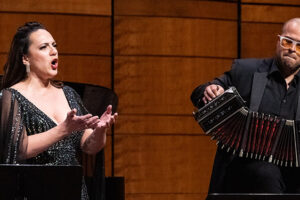

The Metropolitan Opera’s production of Così fan tutte debuted in 1996 with an all-star cast of Carol Vaness, Suzanne Mentzer, Cecilia Bartoli, Jerry Hadley, Dwayne Croft and Thomas Allen. It was a Big Deal Production at the time, and the physical aspect of the production has held up better than many other productions of a certain age. The sets are a nice representation of sunny Italy, and the interiors of the sisters’ house suggest spoiled, rich girls who lived in a beachside resort. However, years have passed and the original blocking is all but extinct. What remains is an amusing but somewhat unimaginative take on Mozart/da Ponte’s delightfully subversive comedy.
It’s almost a checklist Cosi: all the things you “expect” to see onstage in a Così fan tutte production happen exactly so. Men wearing all white in the opening scenes? Check. (Seriously—why is this a Così tradition?) A Despina who mugs in ridiculous disguises? Check. Silly sisters that are determined to pout and simper through life? Check. A sudden, smiley ending? Check.
In order to make this particular conception of Così work, you need to have a cast that is believably young enough that all the partner musical chairs can be chalked up to extreme immaturity. I once compared the Così lovers to the Instagram teens who feel the need to add about a million selfies a day of themselves and their beloved, with cloying sentiments like “I lllllloooovvvvvveeee youuuuuuu myyyyyyyy sexxxxxxyyyyyy boooooooo !!!!!!!!!!!! <3<3<3.”
The lovers don’t realize that this kind of infatuation is not unique, and it’s not special, and it doesn’t last. The ambiguity of the ending to me isn’t about who ends up with whom, but whether the quartet has really matured from the day’s escapades, or whether they’ll just repeat the same infatuated nonsense all over again.
The awkwardness that’s often present in Così productions is that you have rather mature singers acting the part of infatuated teens, and the result is a rather long, unfunny evening. Last night’s performance at the Metropolitan Opera was not just a textbook example of ensemble singing, but also a strong defense of its own Così production. The laughs were constant throughout the evening, and the performers sold the idea of Così as a light comedy better than so many previous, starrier casts. The evening bubbled along like champagne and only the mass exodus to catch the trains when the curtain fell reminded us that this was an almost four hour opera.
Guanqun Yu deserves a lion’s share of the credit for the success of the evening. Two years ago I saw her in a Leonora that was simply “nice” and “promising.” I think she was a little over parted. Her Fiordiligi, however, was superb in every way. First of all, she’s not a prima donna acting young. She is young, and she really played up the vain, somewhat shallow side of Fiordiligi. But she was never obnoxious—this Fiordiligi was a little too stuck on her own good looks and romantic ideals, but Yu was adorable. She’s also extremely pretty.
Yu’s voice is almost everything the part needs. It’s gained a lot in terms of volume and presence, and the voice itself is lovelier than ever: creamy and full in the upper and middle registers, but she has a stronger lower register than Susanna Phillips (the prior Fiordiligi of the run). Her voice doesn’t disappear during parts of “Come scoglio” or “Per pieta.” Her singing has a cleanness and joy that sounds so right in Mozart. Nice trill too.
But there wasn’t a weak link in the entire cast. It was, as I said, ensemble singing at its finest—everyone was involved, everyone added energy and fun to the stage business, even if the stage business is about the same stage business we’ve seen in, well, every Così production. Matthew Polenzani (Ferrando) can often be wooden onstage, but not tonight—he was very funny, and his singing of Mozart is always remarkable for its stylishness. “Un aura amorosa” even ended with a nice trill.
The other pair of lovers (Isabel Leonard as Dorabella, Rodion Pogossov as Guglielmo) were vocally less glamorous but as I said, totally charming. Leonard looks and sounds more mature than Yu, and in this performance Dora was actually the more serious of the sisters, while Fiordiligi was younger and flightier, at least in Act One. But the chemistry between the sisters was such that the switch in traditional roles was completely believable.
Pogossov has a weird voice. If ever there was a baritenor, it would be him. He has the range of a baritone but the timbre of a tenor. More of a character singer than leading man, but as I said, funny and involved.
Don Alfonso (Maurizio Muraro) played his part more like an opera buffa character than a malignant schemer, but as I said, when performers can sell a concept of an opera as well as the cast did last night, I didn’t find myself missing the more ambiguous, darker interpretations. Muraro’s voice also falls into the “character baritone” category, but whatever, it worked. So did Danielle de Niese’s Despina. I didn’t mind her mugging at all—I thought she made the most of the role, and that her voice sounded warmer and less scratchy than it has in the past. Her three short solos were funny and to the point.
A few weeks ago there was a lot of criticism of James Levine’s conducting in Così fan tutte. It’s true that it’s very old-fashioned—no appogiaturas, no cadenzas, no ornamentations, and an approach that might in the old days be called “leisurely.” But he also really knows how to handle this score. He can highlight the simpler beauties of Mozart’s melodic line whereas more Historically Informed Performances often favor an aggressive, driven approach that are more exciting, but less beautiful.
Levine’s made it clear that he considers Così a comedy with an optimistic ending (he cites the C-major key in support). There are plenty of darker, more complex takes on Così fan tutte available on video. Last night’s cast made the best possible case for Levine’s approach to the opera. They were funny, energetic, and engaging. When the curtain fell, you had the feeling that these lovers were as immature as ever, but it was, as I said, optimistic.























Comments